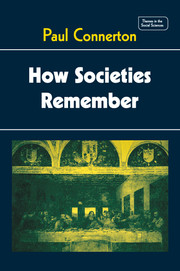Summary
We preserve versions of the past by representing it to ourselves in words and images. Commemorative ceremonies are pre-eminent instances of this. They keep the past in mind by a depictive representation of past events. They are re-enactments of the past, its return in a representational guise which normally includes a simulacrum of the scene or situation recaptured. Such re-enactments depend for much of their rhetorical persuasiveness, as we have seen, on prescribed bodily behaviour. But we can also preserve the past deliberately without explicitly re-presenting it in words and images. Our bodies, which in commemorations stylistically re-enact an image of the past, keep the past also in an entirely effective form in their continuing ability to perform certain skilled actions. We may not remember how or when we first learned to swim, but we can keep on swimming successfully – remembering how to do it – without any representational activity on our part at all; we consult a mental picture of what we should do when our capacity to execute spontaneously the bodily movements in question is defective. Many forms of habitual skilled remembering illustrate a keeping of the past in mind that, without ever adverting to its historical origin, nevertheless re-enacts the past in our present conduct. In habitual memory the past is, as it were, sedimented in the body.
In suggesting more particularly how memory is sedimented, or amassed, in the body, I want to distinguish between two fundamentally different types of social practice.
- Type
- Chapter
- Information
- How Societies Remember , pp. 72 - 104Publisher: Cambridge University PressPrint publication year: 1989
- 5
- Cited by



